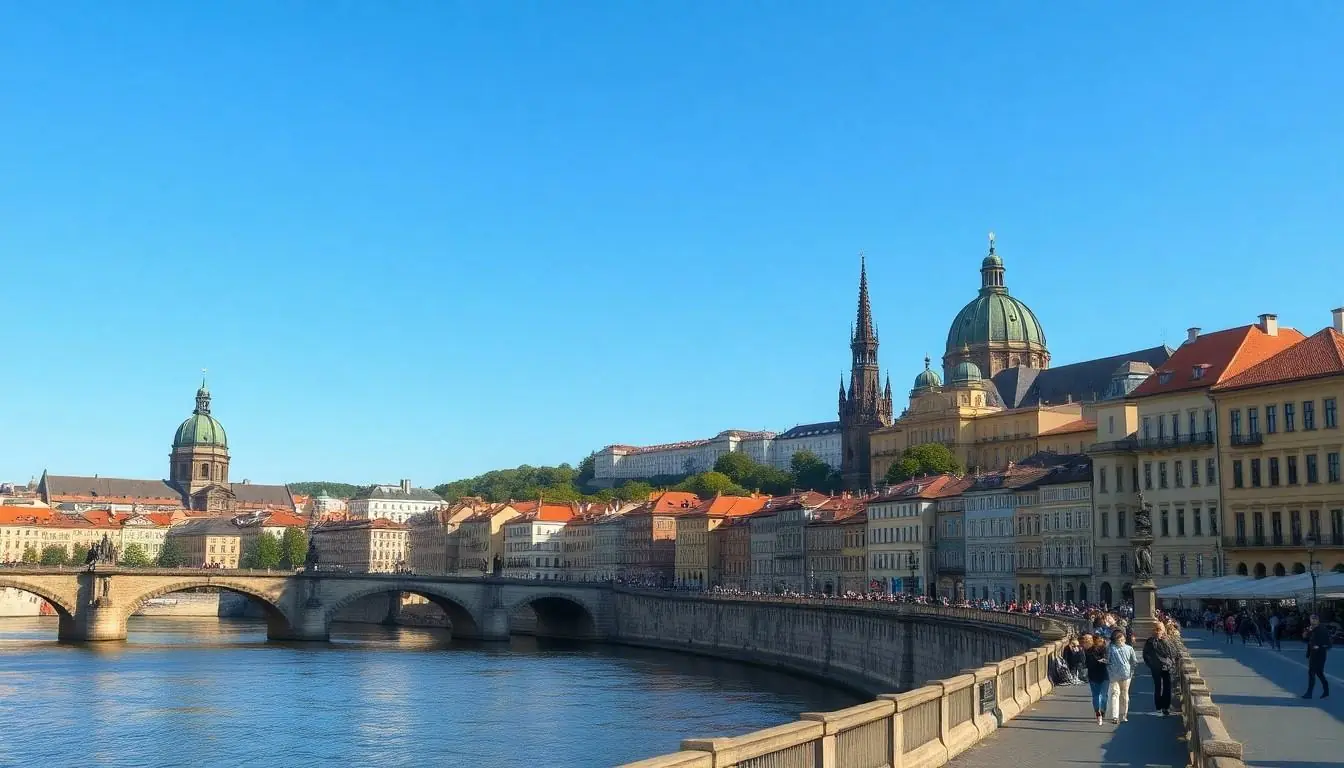Dreaming of sipping espresso in a bustling café in Paris or wandering through the ancient streets of Rome without emptying your wallet? Traveling to Europe on a budget isn’t just a fantasy; it can be your reality. With a sprinkle of creativity and a dash of savvy planning, exploring the continent’s rich culture and stunning landscapes doesn’t have to come with a hefty price tag.
Table of Contents
ToggleOverview of Budget Travel in Europe
Traveling across Europe on a budget is increasingly feasible. Many travelers share experiences of exploring diverse cultures and stunning landscapes without excessive expenses. Budget-friendly options exist in transportation, accommodation, and dining that can significantly reduce costs.
Public transportation in cities such as Paris and Berlin offers reliable and affordable ways to navigate. Train services like Eurail and buses from companies such as FlixBus make intercity travel economical. Utilizing these modes can shorten the distance between attractions while keeping costs low.
Accommodation presents a variety of budget-friendly choices. Hostels, guesthouses, and budget hotels provide affordable rates in major tourist areas. Booking platforms like Booking.com or Hostelworld list options catering to different preferences and financial constraints.
Dining strategically also helps stretch travel budgets. Eating at local markets and street vendors often costs less than dining in tourist traps. Sample traditional dishes without splurging at local eateries known for authentic meals at reasonable prices.
Many attractions offer free or discounted admission days. Museums and galleries in cities like Rome, Madrid, and London frequently waive entry fees on specific days or times. Researching these opportunities allows travelers to experience Europe’s rich history and culture while remaining mindful of budgets.
Planning travel during the shoulder season assists in saving money. Months like April, May, September, and October generally see fewer crowds and lower prices. Taking advantage of off-peak travel ensures access to attractions without long waits and affording a more authentic experience.
With mindful choices, travelers can embrace budget travel in Europe and create lasting memories.
Choosing Your Destinations

Selecting the right destinations plays a crucial role in budget travel across Europe. Travelers can maximize their experiences by choosing affordable yet vibrant locations.
Popular Affordable Destinations
Cities like Prague and Budapest draw budget-conscious travelers with lower costs for accommodations and activities. Prices for meals and public transport in these cities remain economical, enabling visitors to explore without overspending. Lisbon’s charming neighborhoods and stunning views also offer a wealth of free attractions. While Amsterdam’s vibrant culture attracts many, choosing less tourist-heavy areas within the city allows for budget-friendly experiences.
Off-The-Beaten-Path Locations
Exploring lesser-known locales can lead to unique discoveries and savings. For instance, the city of Porto in Portugal boasts scenic views and rich history at a fraction of typical tourist costs. Similarly, Sofia in Bulgaria presents a blend of culture and affordability, often overlooked by travelers. Eastern European cities like Tbilisi in Georgia and Vilnius in Lithuania provide memorable experiences with low price tags on food, lodging, and entertainment. Seeking out these hidden gems helps travelers enjoy Europe’s beauty without straining their budgets.
Budget Accommodation Options
Travelers can find plenty of budget accommodation options across Europe, ensuring comfortable stays without overspending.
Hostels and Guesthouses
Hostels provide affordable lodging with shared facilities. Amenities often include kitchens, lounges, and free Wi-Fi. Guests choose from dormitory-style rooms or private options at a lower price than traditional hotels. Many travelers appreciate the chance to meet others while sharing experiences. Guesthouses, meanwhile, offer intimate atmospheres and personalized services. These accommodations frequently include breakfast and sometimes local tips from owners. Booking platforms help find suitable hostels and guesthouses, making the search straightforward.
Vacation Rentals and Couchsurfing
Vacation rentals present an economical alternative for groups or families. Options like apartments or homes allow travelers to self-cater, saving on dining costs. Platforms like Airbnb and Vrbo help find unique spaces at various price points. Couchsurfing offers an entirely different experience. This service connects travelers with locals willing to provide free accommodation, fostering cultural exchange and camaraderie. Hosts often share insights about their cities, enriching the travel experience. Both options enhance budget travel while providing unique living arrangements.
Saving on Transportation
Traveling across Europe doesn’t have to drain wallets. Utilizing budget-friendly options significantly cuts costs while maximizing experiences.
Affordable Travel Methods
Buses and trains provide economical ways to navigate cities and regions. Companies like Eurolines and FlixBus offer low-cost intercity travel, with prices often lower than flights. Discounted rail passes, such as Eurail, allow unlimited train rides across multiple countries, making multiple destinations accessible. Low-cost airlines like Ryanair and EasyJet also present alternatives, especially for longer distances. Travelers can compare prices using online platforms, ensuring access to the best deals. Flexibility with travel dates often results in further savings.
Tips for Using Public Transport
Researching local transit systems is essential before arriving. Apps for public transport can simplify navigation in cities like Berlin and Budapest. Purchasing day passes often provides unlimited travel for a set period, lowering overall expenses. Prioritize traveling during off-peak hours, as fares sometimes drop outside busy times. Familiarity with unique tram or metro lines helps optimize routes and minimize walking distances. Engaging with locals can provide insights into navigating public transport effectively. Many cities also offer bike-sharing services, which promote budget-friendly transportation while enhancing sightseeing experiences.
Eating on a Budget
Dining out in Europe can be affordable if travelers know where to look. From street vendors to local eateries, plenty of options cater to budget-conscious visitors.
Cheap Eats and Local Food
Many cities boast vibrant food markets and casual dining spots. Sampling street food offers a delicious taste of local culture. Vendors often sell items like falafel in Berlin or crepes in Paris at lower prices than sit-down restaurants. Traditional tavernas in Greece serve hearty meals without breaking the bank. Marketplaces like Mercato Centrale in Florence allow travelers to experience regional dishes at reasonable prices. Opting for lunch specials, usually cheaper than dinner options, can also save money.
Grocery Shopping Tips
Grocery stores provide an excellent alternative for budget meals. Look for supermarkets like Lidl and Aldi, known for their low prices. Convenience stores often stock ready-to-eat meals that can be both affordable and tasty. Purchasing snacks and beverages from these stores helps avoid high costs for meals and refreshments while exploring. Planning simple meals around local ingredients offers an opportunity to enjoy authentic cuisine without splurging. Travelers should also consider buying items in bulk to maximize savings during their trip.
Free and Low-Cost Activities
Travelers can explore Europe without draining their wallets. Numerous free and low-cost activities are available across various cities, enhancing travel experiences while keeping budgets in check.
Sightseeing Without Spending
Free walking tours in cities like Barcelona and Berlin provide engaging insights into local history and culture. Many attractions, such as the British Museum in London and the Louvre in Paris, charge no admission fees. Outdoor spaces like parks and gardens, including the Luxembourg Gardens in Paris and Hyde Park in London, offer leisurely strolls and picnics. Churches and cathedrals often have free entry, allowing visitors to appreciate architectural beauty. Local festivals and events, frequently hosted in major cities, showcase culture without cost. For budget-conscious travelers, exploring these options creates valuable experiences at little to no expense.
Enjoying Nature and Outdoors
Nature lovers find plenty of opportunities to enjoy the great outdoors throughout Europe. National parks, such as Plitvice Lakes in Croatia and Cinque Terre in Italy, feature stunning landscapes with little or no entry fees. Coastal regions, like the Algarve in Portugal and the beaches of Spain, invite sunbathing and swimming without costs. Hiking trails across countries, including the Dolomites in Italy and the Scottish Highlands, provide breathtaking views and adventurous experiences. Local parks and riverbanks in urban areas also allow relaxation away from city bustle. Engaging in these natural activities enriches the travel experience, promoting wellness and appreciating Europe’s natural beauty.
Traveling to Europe on a budget is not only possible but can also lead to unforgettable experiences. With the right strategies in place, travelers can explore vibrant cities and stunning landscapes without breaking the bank. By choosing budget-friendly transportation options and accommodations, dining wisely, and taking advantage of free attractions, it’s easy to stretch a travel budget further.
Planning trips during the shoulder season and venturing to lesser-known destinations can enhance the experience while keeping costs low. Ultimately, embracing creativity and flexibility opens the door to rich cultural encounters and breathtaking sights across Europe. Budget travel can lead to lasting memories and a deeper appreciation for this diverse continent.






